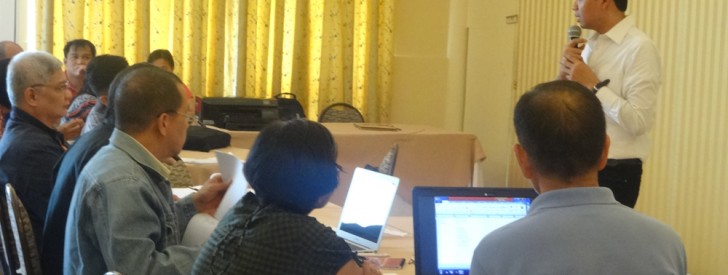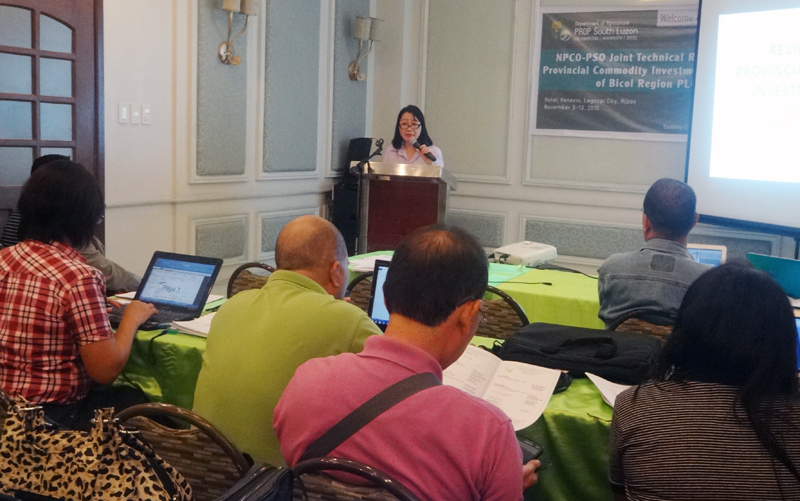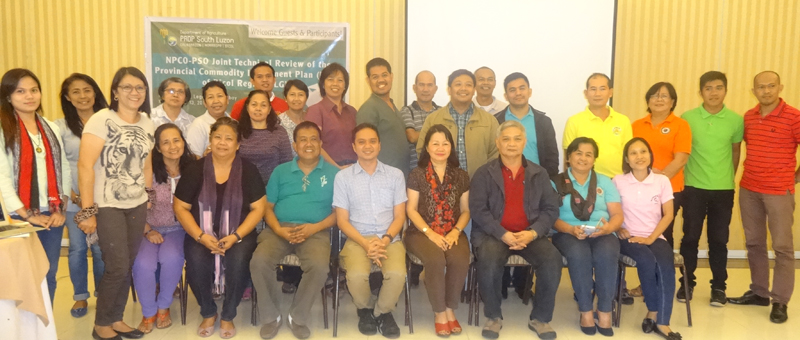 Philippine Rural Development Project (PRDP) Project Support Office South Luzon Director Shandy M. Hubilla emphasizes that forging commitment with other agencies to develop the commodity is the measure of success in PCIP preparation.
Philippine Rural Development Project (PRDP) Project Support Office South Luzon Director Shandy M. Hubilla emphasizes that forging commitment with other agencies to develop the commodity is the measure of success in PCIP preparation. PRDP-Bicol cited as model region in PCIP mainstreaming
November 16, 2015
“At the end of the day, it’s how we forged commitment with other agencies to develop the commodity.” This, according to Philippine Rural Development Project (PRDP) Project Support Office South Luzon Director Shandy M. Hubilla, is the measure of success in Provincial Commodity Investment Plan (PCIP) preparation. Thus, he lauded the initiative of PRDP-Bicol to engage the heads of partner agencies in conducting the technical review of PCIPs for Bicol provinces’ second commodities. “What you’re doing is a good model,” he added.
The National Project Coordination Office (NPCO)-Project Support Office (PSO) Joint Technical Review of Bicol Region Provincial Local Government Units (PLGUs) was held at Hotel Venezia in Legazpi City on November 10-13, 2015. PCIPs for Catanduanes’ abaca and mud crablet, Camarines Norte’s coco geonets and pineapple, and Camarines Sur’s coco sap sugar and cassava were reviewed along with Albay’s coco geonets and sweet potato, Sorsogon’s pili and seaweeds, and Masbate’s live goat and coconut shell charcoal.
A panel of evaluators composed of NPCO I-PLAN Component Head Director Carlos L. Magñaye, NPCO Planning Officer Ferdinand V. Blanco, PSO South Luzon Planning Specialist Rey B. Lara, Regional Project Coordination Office V Deputy Project Director and RTD for Operation and Extension Dr. Elena B. delos Santos and I-PLAN Component Head Aloha Gigi I. Bañaria reviewed the PCIPs’ content and format. Joining them were Engr. Manuel Sn. B. Lucena, Jr. of Department of Science and Technology Regional Office V, Dan R. Alejandro of Philippine Coconut Authority, Melchor L. Aguilar of Department of Trade and Industry, Jimmy Cordero of Regional Agricultural and Fishery Council (RAFC), Mary Ann R. Molina of PhilFIDA, and Nonie P. Enolva of Bureau of Fisheries and Aquatic Resources (BFAR). Marianito A Tesorero of DA RFO V Livestock and Ronaldo B. Coprada of DA FOD also shared inputs on how to boost Bicol’s second priority commodities.
According to delos Santos, the PCIP is considered as the provinces’ Bible for development. This can be done by adding value to the commodities for the benefit of farmers and fisherfolk.
Meanwhile, Lara said that the PCIP is designed to integrate proposed intervention geared towards expanding opportunities in the value chain.
“We want to institutionalize the process. The PCIP is merely not for PRDP use only; it is a living document, a building block to enjoin all agencies and government sector to provide technical support and assistance to gaps identified in the value chain,” Lara added.
He said that the PCIP should be market-driven and private-oriented. He added that PCIPs be aligned with the PRDP mandate to establish climate-resilient and value chain-oriented projects and ensure that gaps in the segment of the value chain are basis for intervention.
He emphasized that the World Bank will monitor the progress of the PCIPs in terms of investments in the value chain. Hence, wider collaboration and forging of partnership with public and private sector is necessary.
Lara complimented PRDP-Bicol’s responsiveness particularly in engaging the banner coordinators and using the PCIP as basis in the 2017 planning and budgeting preparation.
Lucena, on the other hand, acknowledged the PRDP-Bicol’s efforts and recommended engaging more private stakeholders in the planning process. Likewise, Magñaye stressed that the matrix of intervention must have logical relationship, prioritize sequence of interventions, and rationalize them by the volume of production at the start of the chain. Moreover, he required the inclusion of data on road density in the PCIPs to determine the ratio of expected road network and the province’s agricultural area.
Ma. Teresa O. Asido, I-PLAN Component Head of PPMIU-Camarines Sur said that through the technical review with the heads of partner agencies, they were able to capture gaps that would help them enhance the PCIP.
The I-PLAN will conduct a clusterwide workshop on mainstreaming the PCIPs with the Provincial Physical Framework Plan (PPFP) and the Annual Investment Plan on November 24-27, 2015 at Fersal Hotel in Puerto Princesa, Palawan.
PRDP is a six-year project being implemented by the Department of Agriculture that aims to establish an inclusive, market-oriented, and climate-resilient agri-fishery sector nationwide. (Annielyn L. Baleza, I-SUPPORT InfoACE Unit, DA-RAFIS 5)

Regional Technical Director for Operations and Extension and Deputy Project Director Dr. Elena B. de los Santos reminds the participants that the PCIP is the provinces’ Bible for development particularly focused on how to add value to the commodities for the benefit of farmers and fisherfolk.

